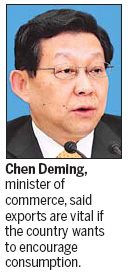Exports still vital to China's growth
Exports should not be sidelined as the nation rebalances its economy to encourage consumption, top government officials and policy advisors said.
 |
There have been growing voices among scholars that the country should stop supporting exports while shifting it focus to domestic consumption.
Zhang Zhigang, a member of the Chinese People's Political Consultative Conference (CPPCC), however, said that if the country wants to encourage consumption, exports are "vital".
"Growing exports can create more jobs and provide the impetus for domestic consumption," Zhang, also chief economist of the Center for International Economic Exchanges, said during the ongoing National People's Congress and CPPCC sessions on Sunday.
Minister of Commerce Chen Deming on Saturday said that export-related sectors provide at least 90 million jobs - about 7 percent of the national population - and therefore affect consumption.
"How can we expect them to spend and consume more if they lose their jobs or have their salaries cut because of grim exports?" asked Chen.
China's exports, which experienced robust growth of more than 25 percent before 2008, dropped by 16 percent last year. Economists believe the growth will remain at 15 percent this year.
"China should strike a balance between stabilizing exports and spurring domestic consumption, to optimize its economic structure," said Zhang.
In the annual government work report last Friday, Premier Wen Jiabao outlined China's trade policy, saying it will "develop exports in a steady way" this year.
"It means China will not ignore exports, but is considering the issue seriously," said Zhang Xiaoji, a CPPCC member and senior researcher at the Development Research Center of the State Council. "It is no doubt good news for China's manufacturers and exporters", since many of them are still suffering from the fallout of the global financial crisis.
The country should continue its export-supportive policies and keep the Chinese currency, or yuan, at a "reasonable" level, Zhang Zhigang said.
However, overseas pressure - both from the United States government and currency speculators - is mounting for China to hasten the appreciation of its yuan, since they believe the yuan is undervalued.
Zhou Xiaochuan, governor of the central bank, said on Saturday that China must be "very cautious" in resuming yuan appreciation, which stopped in the second half of 2008. Zhou said it is only a temporary measure for dealing with the crisis, which means that the door for yuan appreciation remains open, analysts said.
"But we are not sure whether it will come next week or the second half of this year," said Stephen Green, head of research of Standard Chartered Bank (China).
 0
0 






